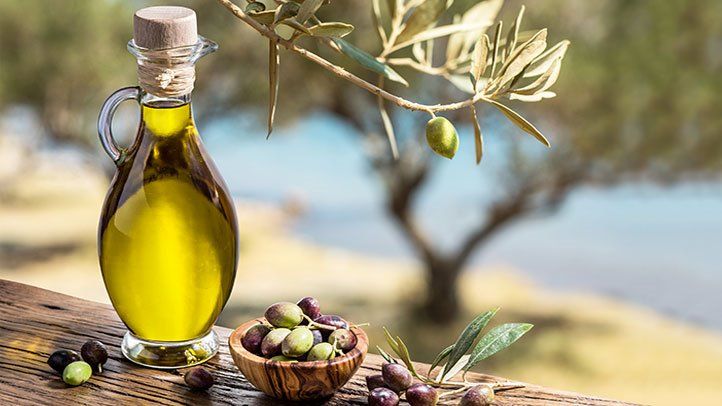
Lebanese olive oil, Lebanon is well-known for its luxurious olive orchards dating back hundreds of years. The country is a haven for a number of the most ancient olive trees on earth, most of which date back over 1,500 years. Even though the origin of the olive tree is unknown, several studies shows that the olive was first grown on the shores of the Mediterranean along the coasts of Lebanon and Palestine and the Phoenician were the first to domesticate and adapt the wild olive tree to cultivation. Since 1600 BC, Phoenicians brought in the olive tree to Greece and then to Italy, France, Spain and lastly North Africa. Olive trees take up an area of 563 km2 (56,300 ha) in Lebanon, which is 5.4% of the country’s area, or 8% of entire farming lands. Lebanon’s olive trees are largely rain-fed. Only 8% of the olives grown area is irrigated. This is primarily on account of the somewhat plentiful rainfall in the country.
Around 70% of the olive cultivated is for the production of olive oil and the leftover is destined to the production of table olives. The Lebanese olive oil output of Lebanese olives amounts from 18-25%. In addition olives harvested in October and November deliver higher yields than those grown earlier or later on in the season. The milling procedure also has an effect on yields: modern mills remove between 8-12% more oil from the olive inclusive of oil that must be processed, and pomace oil.
Diverse qualities of olive oil are produced, the perfect being extra virgin olive oil. Extra virgin lebanise olive oil need to be made by olives that are totally free of any kind of disease, harvested at the ideal time, and processed right away. If the olives are selected from the ground rather than the tree, the quality of the final oil is jeopardized. No chemicals need to be put into the oil, and the last oil has to pass many tests and meet numerous strict standards, to be considered extra virgin.
Health Benefits:
The Lebanese olive oil has a numerous health benefits; possessing an abundance of health protective nutrients. Also Olives have many variations and distinct shade of colors and are the cornerstones of the Mediterranean diet which are considered some of the healthiest diets all over the world.
Although a diet full of saturated fat may likely add to the risk of diseases, healthy fats in our every day diet like olives and olive oil protects from numerous chronic diseases like diabetes, high blood pressure, heart diseases and cancer. Additionally, olives and their oil hold a great deal of antioxidants that is one of the components responsible dealing with inflammation with powerful health advantages. Also they are an excellent source of Vitamin E and K and carotenoids and are popular for their role in defending, nourishing and hydrating the skin and hair.
After knowing the health benefits of olives and olive oil, make sure to add them in your diets always but remember that ‘’moderation is key” because of their high caloric content.
Olives could be included in salads, Tabouleh, Muhammara, and in numerous tasty recipes with pasta, fish, potato, cheese and pita bread. Also they are used to make spreads and tapenade. Don’t just worry about the fats, olive possess healthy fats compared to other fats. Nouri Shopping Center carries over 20 brands of Olive Oil.

